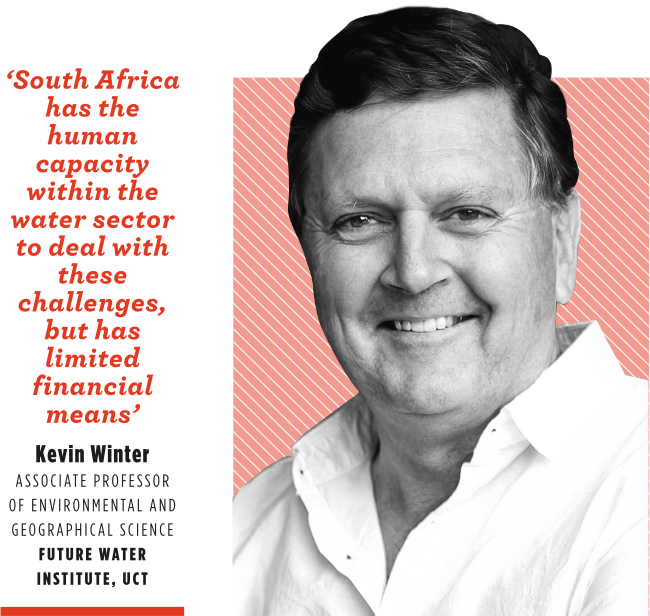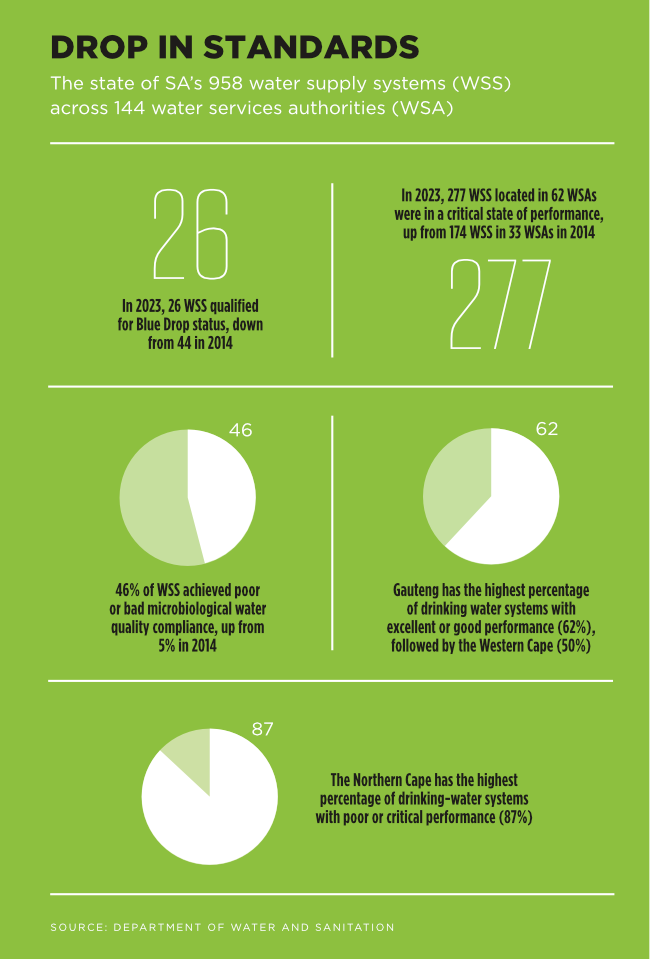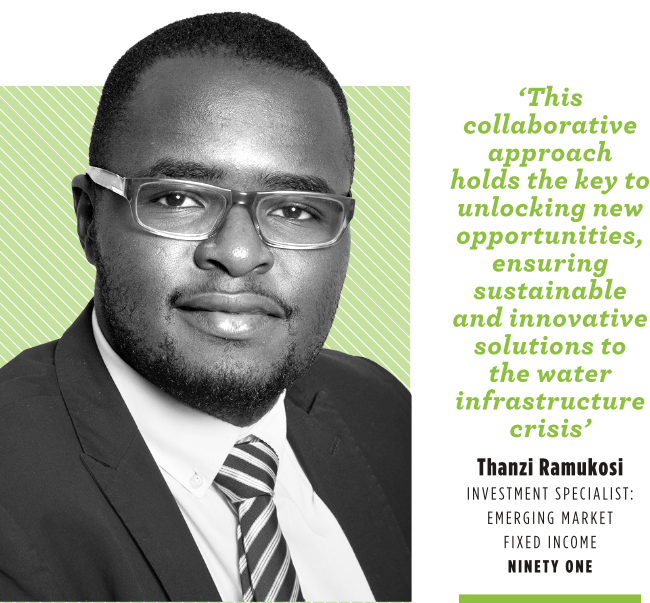Is there a tougher job in SA apart from water management? The Blue Drop Audit report by the Department of Water and Sanitation found that nearly half (46%) of all SA’s water-supply systems pose acute human health risks, while 67.6% of all wastewater treatment works are close to failure. Meanwhile, more than 47% of all clean and treated water is lost through leaks or cannot be accounted for.
Major metros across the country have faced Day Zero scares or water-shedding restrictions – and the problem is only getting worse.
Kevin Winter, an associate professor of environmental and geographical science at UCT’s Future Water Institute, sees SA’s water challenges as a combination of many issues. ‘Climate change is influencing water resources and it’s already influencing water supply and quality in parts of the country where temperatures have risen by 2°C and are experiencing variable rainfall,’ he says. ‘The other major challenge is sufficient capital investment and forward planning in water-related infrastructure and realistic costs in managing and maintaining existing operations.
‘Future water-infrastructure investment that is required to support an increasing population and to address climate change will be wholly inadequate without significant economic growth. I do believe that South Africa has the human capacity within the water sector to deal with these challenges, but has limited financial means.’
Government, of course, has a role to play here. According to Michelle Toxopeüs, legal researcher at the Helen Suzman Foundation, the challenges relating to SA’s water infrastructure are manifestations of larger, systemic issues in national and local government.
‘The department [of Water and Sanitation] is facing institutional and governance challenges that severely compromise its financial sustainability,’ she writes in a recent brief. ‘The functioning of municipalities is at risk of failure because of financial mismanagement, a general failure to plan and a lack of accountability. As state actors that are tasked with managing water resource and service infrastructure, the issues expressed directly affect the condition of public infrastructure. Unless the governance issues are remedied, the condition of infrastructure will continue to deteriorate.’
Winter believes that government needs to be ‘far more aggressive’ in dealing with future water challenges and agile in supporting local authorities to deal with the growing urban crisis of water quality. ‘The responsibility for managing water has been left to ailing municipalities to supply water to towns and cities and to treat water. A top-down, largely hands-off approach is leaving struggling municipalities in the lurch. The consequences are having a significant effect on water availability in urban areas and on surface and groundwater contamination. This is the model that was written into the National Water Act of 1996, and it needs to change.’
According to the Blue Drop Audit Report, SA needs R1.5 billion to fix its water infrastructure problems.
‘Almost all of South Africa’s water infrastructure is developed and managed by the public sector, municipalities and government,’ says Thanzi Ramukosi, investment specialist: emerging market fixed income at Ninety One in an opinion article. ‘However, years of under-investment and neglect have awakened the private sector to the opportunity to invest in water infrastructure. Likewise, government has recognised the scale of the funding required for broader infrastructure, with a focus on water, energy and transport, and is now actively seeking private-sector participation.
‘There is strong recognition from the relevant players in the water industry that mismanagement and corruption in government have led to over-regulation, limiting the agility of responses and leading to inefficient procurement processes and under expenditure.’
Some argue that full privatisation is the answer. Winter – and anybody who’s paid a water bill in the UK – disagrees. The UK privatised its water 30 years ago. It has not gone well. As the Financial Times recently put it, ‘water privatisation looks like little more than an organised rip-off’.
Jonathan Portes, professor of economics and public policy at King’s College London, agrees. Writing for the Guardian in 2022, he recalled that ‘I was a very junior Treasury official working on the water privatisation project, responsible for securing value for money for taxpayers and water consumers. In retrospect, we utterly failed on both counts: the shares were sold well below their value so taxpayers lost out, and consumers have paid through the nose ever since’.
Winter argues that privatisation of water delivery is never the answer. ‘There are too many examples elsewhere where private water companies do not perform better, and where the cost of water is excessive. South Africa can’t afford to go down this route. Private companies can and do assist. They have the expertise, but many are only surviving in South Africa amid limited opportunity and are forced to work elsewhere in the world to survive. Another lost opportunity to accelerate the water investment, innovation and expertise in South Africa.’
If the UK shows why full privatisation of water infrastructure doesn’t work, Tunisia offers an example of how private sector involvement is successful. There, French-based multinational the Suez Group partnered with the state-owned Onas in 2023 to clean up wastewater in a drought-stricken region in the country’s south, which serves nearly a million people. The 10-year concession contract, worth €200 million, will be financed by the World Bank for the rehabilitation and extension of the infrastructure, and by the Tunisian state for its operation and maintenance.
In addition to the renovation of existing equipment, the contract provides for, among other things, ‘the reuse of wastewater in agriculture’ and ‘treatment of the nitrogen and phosphorus contained in wastewater’ to release better quality water into the environment.
Little wonder, then, that Senzo Mchunu – who at the time was SA’s Water and Sanitation Minister – invited the private sector to invest in water infrastructure projects, pointing to the Mbombela concession, iLembe concession and Durban Water Recycling Project as examples of existing water public-private partnerships (PPPs) that have consistently delivered value for all parties. Mchunu’s call was backed by the department’s move to establish the National Water Resource Infrastructure Agency, which will ensure sustainable, equitable and reliable supply of water from national water resources infrastructure.
Figures such as the R1.5 billion cited by the Blue Drop Audit report represent a huge burden on public-sector balance sheets. Olebogeng Manhe, chair of the Gap Infrastructure Corporation, argues that PPPs can manage the fiscal risks while ensuring efficient service delivery and returns on investment. ‘Private infrastructure development partners are able to offer critical technical skills and financial support for large-scale projects that deliver sound long-term solutions,’ he writes in an opinion piece.
‘In terms of financial support, PPPs can further play a role in assisting government to attract private investment into water-infrastructure projects. And through competitive tender bidding procedures, public-sector partners can likewise ensure that they maximise the value of each rand spent.
‘These measures will help bridge the funding gap and facilitate a higher quantity and quality of larger-scale projects. The risk-sharing nature of PPPs ensures that the private sector also assumes a substantial portion of the financial, technical and operational risk involved in infrastructure projects. This means that infrastructure developers assume the responsibility and are accountable for ensuring that projects are completed on time, within budget and according to standards set by public partners.’
Yet as Ramukosi points out, the successful implementation of PPPs hinges on resolving issues such as non-payment, especially in the realm of local government finance. ‘Addressing these challenges is paramount to fostering a strong partnership between the public and private sectors,’ he says.
‘With the right policies and regulations in place, government can create an enabling environment, encouraging increased private-sector engagement in water infrastructure projects. This collaborative approach holds the key to unlocking new opportunities, ensuring sustainable and innovative solutions to the water infrastructure crisis, and paving the way for a prosperous future for South Africa.’
Winter agrees that government and local authorities are not adept at working with the private sector. ‘There are all sorts of reasons for this, such as the central control of infrastructure investments and assets,’ he says. ‘This closes the opportunity, for example, for private investors to participate in public bonds that could secure long-term, stable returns for the investor and could raise capital that will accelerate much-needed water infrastructure.’
Of all the leaks in SA’s water infrastructure system, that seepage of investor trust may be the hardest – and most important – to plug.











